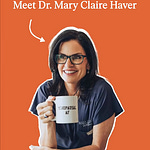For a long time, I believed that menopause was something to simply “get through.” I thought if I stayed active, ate well, and maintained a healthy weight, I’d be fine. That assumption didn’t hold. When I hit perimenopause, I was blindsided, not just by the night sweats and brain fog, but by the creeping weight gain, the unrelenting fatigue, and the aching joints that made everyday life harder than it should be.
As I began to dig into the science, first for myself, then for my patients, it became clear that menopause is not just about hot flashes and skipped periods. It’s a whole-body transition that affects the brain, bones, heart, metabolism, skin, gut, and more. Thriving through menopause requires a strategy. This strategy is informed by evidence, customized for your life, and rooted in the understanding that aging well is not a passive process.
Here’s the routine that keeps me grounded and vibrant. It’s built on years of clinical experience, thousands of patient conversations, and the best data I could find.
1. Pharmacology: I optimize my hormones
Hormone therapy changed everything for me. Once I understood the role of estrogen and progesterone in regulating sleep, protecting bone, supporting cognition, and modulating metabolism, it was clear that replacing what I had lost was not just about comfort—it was about prevention. I work with my clinician to ensure my regimen is personalized, consistent, and grounded in best practices.
Modern menopausal hormone therapy (MHT) is not what it was 20 years ago. We now have decades of follow-up data showing that when initiated around the time of menopause, MHT reduces the risk of osteoporosis, type 2 diabetes, and even cardiovascular disease. However, many women continue to face access barriers. I’m here to change that.
2. Supplements: I support the foundation
I believe in food first, but targeted supplementation fills important gaps. My daily lineup includes:
Omega-3 fatty acids for cardiovascular and cognitive protection
Vitamin D + K2 for bone mineralization and immune balance
Creatine to support muscle function, especially in women post-40
Fiber and probiotics for gut and metabolic health
Magnesium L-threonate to improve sleep quality and cognitive clarity
Collagen peptides for skin elasticity and joint support
These aren’t trendy add-ons. They’re researched, evidence-based tools I’ve integrated into my practice and my life.
3. Exercise: I lift heavy things
Resistance training is not optional. After 40, women lose muscle mass at an accelerated rate. The loss of muscle doesn’t just affect strength. It drives metabolic decline, insulin resistance, and increased frailty over time.
I strength train 3 to 4 times a week, focusing on progressive overload, compound movements, and functional strength. I pair that with cardio, usually walking or hiking with a weighted vest, to support cardiovascular fitness and mental clarity.
Exercise is medicine. But the dosage, type, and timing matter. We are not just shrinking fat. We are building the muscle, bone, and mitochondrial resilience that will carry us into our later decades with power.
4. Stress Reduction: I protect my brain and my hormones
The menopause transition is a vulnerable window for mental health. Anxiety, depression, and irritability often surge, not because we are weak, but because estrogen plays a key role in modulating neurotransmitters like serotonin and GABA.
I prioritize daily habits that calm my nervous system. Deep breathing, mindfulness, and even short walks outdoors help me regulate cortisol. When cortisol stays elevated, belly fat accumulates, sleep suffers, and mood worsens. Addressing stress is not “soft.” It’s science.
5. Sleep Optimization: I treat sleep like a vital sign
Sleep is not a luxury in midlife. It’s a lifeline. Poor sleep worsens almost every symptom of perimenopause, from brain fog to blood sugar swings to cravings. I follow a strict wind-down routine, avoid late screens, and create a cool, dark bedroom environment.
Magnesium L-threonate and hormone therapy have helped restore my circadian rhythm. I track my sleep and course-correct when needed. Without sleep, nothing else works.
Menopause does not mean decline. It means change—and with change comes the opportunity to rebuild. My routine is rooted in science, refined by experience, and flexible enough to adapt to life’s demands. I share it not because it’s perfect, but because it works for me and the thousands of women I’ve worked with.
If you’re navigating this transition, know that you are not alone. There are tools. There is support. And there is power in knowledge.
📖 Explore more in The New Menopause
🛒 Supplements and resources: thepauselife.com







Share this post